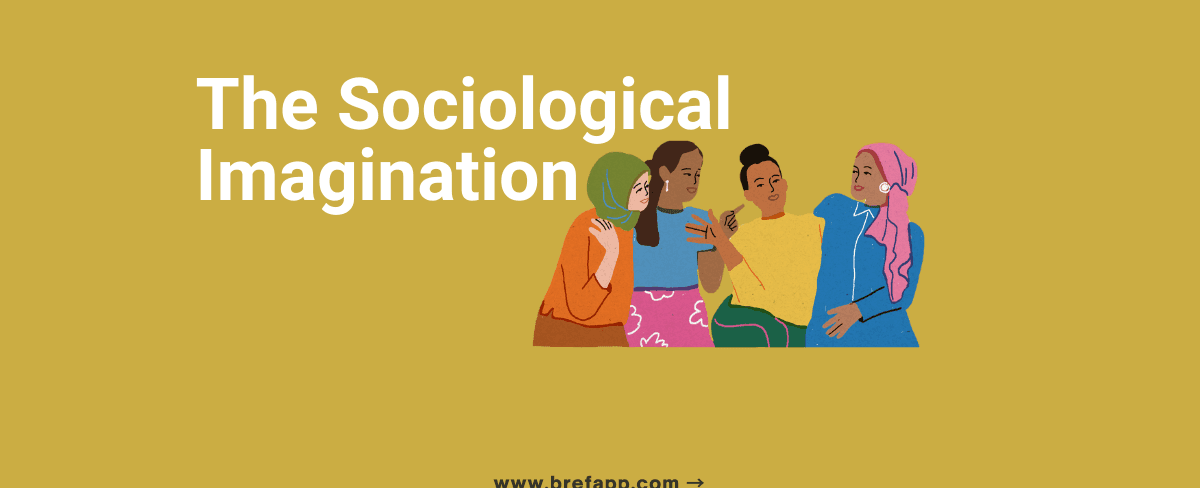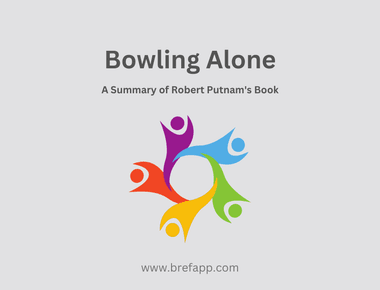
The Sociological Imagination: A Summary of C. Wright Mills' Book

Sociology is the study of human society and social behavior. It examines the social, cultural, and economic factors that influence individuals and groups, and how they interact with one another. One of the key concepts in sociology is the sociological imagination, which allows individuals to understand the social context in which their personal experiences occur.
In his book “The Sociological Imagination,” C. Wright Mills presents a compelling argument for the importance of this concept. He suggests that individuals must view their personal experiences in a broader social context to understand how social structures and institutions shape their lives.
In this article, we will explore the concept of the sociological imagination, its key components, and how it can be applied in practice. We will also discuss the historical and social context in which Mills developed this concept, as well as some of the criticisms and controversies surrounding it. By the end of this article, readers will have a deeper understanding of the sociological imagination and its significance in contemporary sociology.
The Author: C. Wright Mills
C. Wright Mills was a prominent sociologist who was born in Waco, Texas in 1916 and passed away in 1962. He is widely regarded as one of the most influential social thinkers of the 20th century. Mills earned his Ph.D. in sociology from the University of Wisconsin-Madison in 1941, and later taught at several universities, including Columbia University.
Mills’ contributions to sociology are numerous and far-reaching. He was a prolific writer who produced several influential books and articles, including “White Collar: The American Middle Classes” and “The Power Elite.” He was also a key figure in the development of the New Left movement in the 1960s.
Mills’ work is still relevant today because it challenges individuals to think critically about the social world around them. He argued that individuals must look beyond their personal experiences and consider the broader social and historical context in which those experiences occur. This perspective is particularly important in today’s society, where issues such as inequality, racism, and globalization continue to shape the lives of individuals and communities.
Mills’ work also continues to influence contemporary sociology. His ideas about the power of the elite, the role of the media in shaping public opinion, and the need for a more critical and engaged sociology are still widely debated and discussed today. As such, Mills’ legacy in sociology remains strong, and his work will continue to inspire new generations of scholars for years to come.
The Sociological Imagination: What is it?
The sociological imagination is a concept introduced by C. Wright Mills in his book “The Sociological Imagination.” It refers to the ability to see the connections between our personal experiences and the broader social, cultural, and historical context in which they occur.
According to Mills, the sociological imagination has three key components: historical, structural, and critical. The historical component involves understanding how social issues are shaped by historical events and social structures. The structural component involves understanding how social institutions and structures, such as the economy or government, shape our personal experiences. The critical component involves the ability to question and challenge social norms and values that may be unjust or oppressive.
The sociological imagination is important for understanding social issues because it allows individuals to see beyond their personal experiences and consider the broader social context in which those experiences occur. For example, the sociological imagination can help individuals understand how their personal experiences of unemployment or poverty are shaped by larger economic and political forces. By understanding the broader social context, individuals can develop a more nuanced and critical understanding of social issues, which can help them identify potential solutions and take action to address them.
The Historical Context: How Did Mills Develop the Sociological Imagination?
C. Wright Mills developed the concept of the sociological imagination in the 1950s, a time of great social and political change in the United States. The post-World War II period saw significant economic growth and social mobility, but it was also a time of deep social inequalities and injustices. Mills was deeply influenced by the political and social climate of the time and saw the need for a new kind of sociology that could address these issues.
Mills’ personal experiences also played a role in his development of the sociological imagination. He grew up in a working-class family in Texas and later attended the University of Texas and the University of Wisconsin-Madison, where he was exposed to a range of political and intellectual ideas. He also served in the Army during World War II, an experience that gave him a critical perspective on government and power.
Mills’ academic background also influenced his thinking. He was trained in the tradition of the “Chicago School” of sociology, which emphasized the importance of empirical research and fieldwork. However, Mills was critical of the dominant approach in sociology at the time, which he saw as too focused on technical analysis and divorced from the broader social and political context.
In developing the sociological imagination, Mills sought to create a new kind of sociology that could address the social and political issues of the day. He saw the need for a more critical and engaged sociology that could challenge existing power structures and promote social justice. This approach has continued to influence sociology to this day, and the sociological imagination remains an important concept in contemporary sociology.
The Sociological Imagination in Practice: Examples
The sociological imagination can be applied to a wide range of real-world situations, helping individuals to understand the broader social context in which their personal experiences occur. Here are a few examples:
- Unemployment: The sociological imagination can help individuals understand how their personal experiences of unemployment are shaped by larger economic and political forces. By understanding the broader social context, individuals can see how unemployment rates are influenced by factors such as globalization, technological change, and government policies.
- Racism: The sociological imagination can help individuals understand how personal experiences of racism are shaped by larger social and historical forces. For example, by understanding the history of slavery and segregation in the United States, individuals can better understand the persistence of racial inequalities today.
- Gender Inequality: The sociological imagination can help individuals understand how personal experiences of gender inequality are shaped by larger social and cultural norms. By understanding how gender roles and expectations are reinforced through social institutions such as the family and the media, individuals can see the broader social context in which gender inequality occurs.
- Health: The sociological imagination can help individuals understand how personal experiences of health and illness are shaped by larger social and environmental factors. By understanding how factors such as poverty, pollution, and access to healthcare are linked to health outcomes, individuals can see the broader social context in which their personal health experiences occur.
In each of these examples, the sociological imagination helps individuals see beyond their personal experiences and consider the broader social context in which those experiences occur. By doing so, individuals can develop a more nuanced and critical understanding of social issues, which can help them identify potential solutions and take action to address them.
Criticisms and Controversies
The concept of the sociological imagination, while widely influential, has faced criticism and controversy since its inception. One criticism of the sociological imagination is that it can be too focused on the individual, neglecting the importance of larger social structures and institutions. This criticism has influenced the development of sociology by prompting scholars to integrate a more nuanced understanding of social structures and institutions into the sociological imagination.
Another criticism of the sociological imagination is that it can be politically biased, with some arguing that it favors left-leaning political perspectives. This criticism has led some scholars to emphasize the importance of objectivity and diversity in sociology, recognizing the need to incorporate multiple perspectives and approaches in the study of social life.
Additionally, some critics argue that the sociological imagination oversimplifies complex social issues, failing to account for the diversity and complexity of social life. This criticism has influenced the development of sociology by prompting scholars to explore more nuanced and complex approaches to understanding social issues.
Despite these criticisms, the sociological imagination remains a significant and influential concept in sociology. Scholars have continued to refine and develop the concept over time, incorporating new perspectives and approaches to address some of the criticisms and controversies. Ultimately, the sociological imagination has contributed to the development of sociology as a discipline by encouraging scholars to think critically about the broader social context in which individual experiences occur, and to work towards a more just and equitable society.
Final Toughts
This article has provided an overview of C. Wright Mills’ concept of the sociological imagination, its key components, and its importance in understanding social issues. We have discussed how Mills’ personal experiences and academic background influenced the development of the sociological imagination, as well as some examples of how it can be applied in practice.
Furthermore, we have analyzed some of the criticisms and controversies surrounding the sociological imagination, which have influenced the development of sociology as a discipline. Despite these challenges, the sociological imagination remains a crucial framework for understanding the complexities of social life and promoting social change.
Mills’ work continues to be relevant in contemporary sociology because it offers a critical perspective on the social world and challenges individuals to think beyond their own personal experiences. In today’s society, where social issues continue to persist and evolve, the sociological imagination remains an essential tool for understanding and addressing these issues. By encouraging individuals to think critically about the broader social context in which they live, Mills’ work continues to inspire scholars and activists to work towards a more just and equitable society.
Tags
Related Posts





Quick Links
Categories

